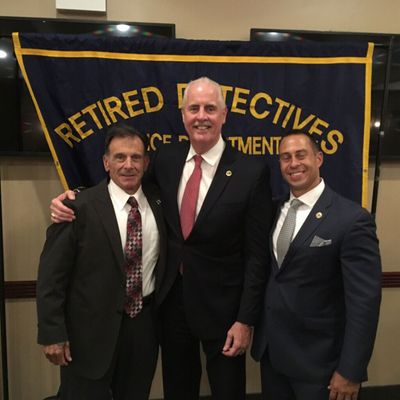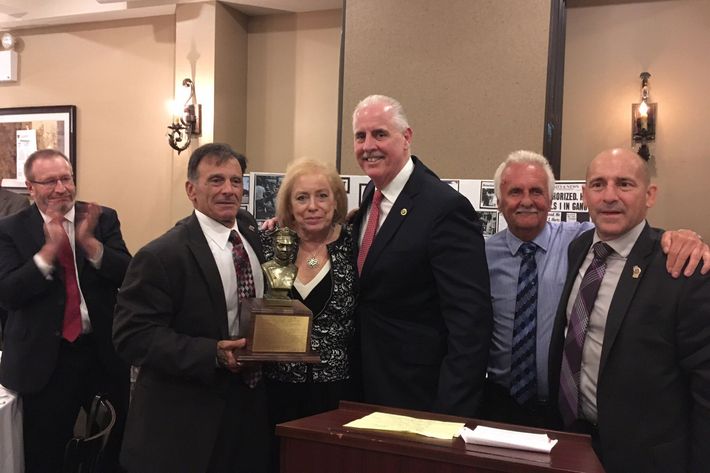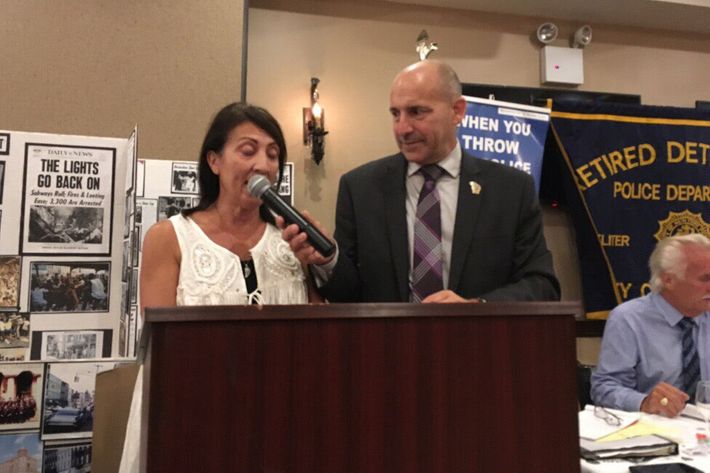
“Don’t beat the shit out of him,” says the former NYPD detective Kenny Hieb, by way of introducing me to my tablemates. “He’s a reporter.” We’re in O’Neill’s pub in Maspeth, Queens, in a windowless back room full of mustachioed ball-busting ex-cops in boxy suits drinking Budweisers. It’s the monthly dinner for the RDNY, the Retired Detectives of New York, an association founded in 1965 that has honored everyone from Boomer Esiason to the SEAL who shot bin Laden. A few minutes later I’m standing near a bar cart festooned with a Blue Lives Matter crest. Someone yells at the bartender, “Get this guy drunk, he’s a reporter!” (Full disclosure: I had a Budweiser.)
Tonight, two well-known NYPD detectives, John Russo and Louis Scarcella, are to be celebrated. Russo became a tabloid hero earlier this year, when he helped solve the ghastly murder of the Howard Beach jogger Karina Vetrano. Scarcella has been famous, and infamous, for far longer. In the 1980s, during one of the worst crime waves the city has ever known, Scarcella — a flashy second-generation detective from Bensonhurst — became renowned for a sterling arrest record in high-profile murder cases and a preternatural ability to coax confessions.
In 2013, however, allegations emerged that Scarcella had fabricated the confession in the case of the notorious 1990 murder of Rabbi Chaskel Werzberger. The suspect, David Ranta, was freed after 22 years in prison. That sparked a chain reaction. To date, 12 Scarcella-related convictions have been overturned. That includes the double-murder conviction of Shabaka Shakur, who’s since opened a Brooklyn restaurant that’s become something of a hangout for fellow arrestees of Scarcella’s. Lawsuit payouts from the city and the state in the overturned Scarcella cases now total over $37 million.
“I invited you here to show our side,” Hieb — who is the president of the RDNY and also served on the NYPD’s Joint Terrorist Task Force everywhere from D.C. to Yemen — explained to me. “Bad cops are bad cops. I’ve locked up bad cops. Running drugs, all that. Lou’s not a bad cop. Lou’s a fucking good cop.”
Hieb believes the allegations against Scarcella are financially motivated, both from the arrestees and the media. “They nitpick on bullshit to make a newspaper article,” he says. “You write ‘Dirty Cop’ on the cover of the Post and it sells papers. You say ‘Good Cop. Saves Babies’ — not selling. Look, we all know abusive cops. But you got assholes that are police officers, you got assholes that are plumbers, you got assholes that are newspaper writers. When I fuck up it sells papers. When you fuck up nobody cares.”
The Brooklyn DA is currently conducting an ongoing investigation of roughly 70 of Scarcella’s old cases. The DA, however, has been clear that it is not accusing Scarcella directly of criminal wrongdoing. As the Times pointed out earlier this year, by not charging Scarcella “the district attorney’s office has relieved itself of a handful of unpleasant consequences,” including even bigger payouts. As Hieb sees it: “He’s been exonerated of any wrongdoing! He’s been exonerated!”
A few minutes later, the evening’s program begins. Hieb presides at a central table alongside a kindly white-haired priest and RDNY’s chairman of the board, a pugnacious sexagenarian named Johnny Wilde. To their right is a poster reading “When you throw the police under the bus tragedies happen.” It features a cop staring down a literal parked bus, as if to say, not today, friend.
The task of speechifying Scarcella falls to Wilde, and he’s fiery from go: “We wore that shield, and there ain’t nobody in the world can ever do anything against our shield!” Wilde recalls seeing Scarcella on the news in the Brooklyn courthouses, and how disgusted he was, and how he would have gotten down there to show support himself … but, uh, “bad news trying to get to Brooklyn to go to the courthouse, ’cause you can’t park when you’re out there.” The crowd murmurs in acknowledgment of the tricky parking situation.
“They called him Detective Disgrace,” Wilde continues, scoffing. “But then again most people think Shades of Blue is a true story.” Now there’s some murmurs of confusion. “Shades of Blue,” Wilde says again. It’s on NBC. It stars J.Lo and Ray Liotta.
Wilde circles back to his point: that Scarcella has been officially cleared of all charges. “It wound up on page 16. You gotta get past the weather and everything. You never saw it. So now we’re saying: Lou Scarcella did nothing wrong. So what the hell is yous trying to pull?”
As Scarcella comes up to the podium to receive his statuette, the room breaks out into a standing ovation complete with whistles and shouts of “Louie! Louie!” Barely fighting off tears, he promises, “I’m not gonna say anything bad about anyone.”
Afterward, I grab a few minutes with Scarcella. The first thing he says is, “I can’t say anything about any cases.” The only way he’d be prosecuted now is if he perjures himself while in court for the reinvestigations of his old cases. Of the RDNY statuette, he says, “It was wonderful, what they did. One of the greatest honors of my life.”
Why do you think they did it now, I ask? “Well, I guess they thought it was time. Enough was enough. And it wasn’t only about me. It was about all the detectives that carry the shield in New York City.”
Do you think this will change your public perception? “I have nothing to say about public perception. These are my friends, these are detectives I work with. They’re honorable men and the greatest detectives in the world.”

Wilde sidles up next to me, so I ask, How did you make the decision to honor Scarcella now? And what about the people that would say this was disrespectful to — “We honor! We honor!” Wilde shouts. “We did justice for the people of New York. All the citizens. That’s all. If they can’t get over it, get a life. Get a life! Go out and do it before you talk about it. Get a life!”
Someone grabs Wilde. “You gotta come eat the cake with your hands!” I go to look for Scarcella. He’s already made his way outside, where he’s waiting patiently for the valet.
Before the night is up, John Russo would get his turn at the podium. Honoring him would be the mother of Karina Vetrano, whose murder Russo solved. Visibly shaken, Ms. Vetrano would say, “Detective Russo — there are no words. It’s a horrible world where people have no respect for the police. I wanted to thank you for the service you provide people like me every single day. That’s the only thing that held me up through this.”
Russo helped find the Howard Beach attacker by flashing back to a “suspicious person” 911 call he’d followed up on months before. It’s a true iteration of that classic, cinematic “detective’s intuition” that cops love to valorize. It’s the same one Scarcella was so famous for before the allegations appeared to suggest he was just making all that shit up. But Russo, working on his hunch, eventually helped the NYPD connect the murderer to the Vetrano case with DNA evidence.

The allegations against Scarcella conjure up corruption — and speak to why so many New Yorkers distrust and fear the NYPD. Russo’s investigative craftiness exemplifies the kind of unspeakable relief only the police can provide. A gulf exists between the extremes, with all the good and the bad and the indifferent and the incompetent that also exists in New York policing. But in the back room of O’Neill’s, there’s not much appetite for nuance. Here, all cops are working their asses off to protect and to serve, and if you never wore the shield you’ll never understand what it’s like.
Before I leave the bar I circle back with Hieb and a couple other ex-cops having a few last rounds. The priest’s collar is loose by now. I ask Hieb one more question. Relations between the people and the police don’t seem to be too good right now. So what would he advise cops today? “Just do your job,” he says. “Common sense prevails. Right is right.”





























